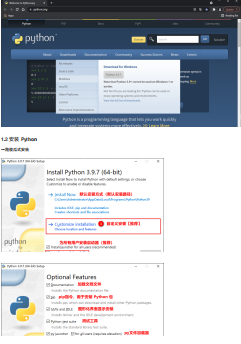为找教程的网友们整理了c语言相关的编程文章,网友濮香桃根据主题投稿了本篇教程内容,涉及到c语言检测ip能否ping通、用c/c++代码检测ip能否ping通(配合awk和system可以做到批量检测)、c语言检测ip能否ping通相关内容,已被667网友关注,内容中涉及的知识点可以在下方直接下载获取。
c语言检测ip能否ping通
遇到一个小需求, 快速搞定。 来看看用C/C++代码检测ip能否ping通:
#include <iostream>
#include <stdio.h>
#include <stdlib.h>
#include <string.h>
#include <unistd.h>
using namespace std;
string getCmdResult(const string &strCmd) // 这个是获取命令执行的结果, 类似于system, 之前我已经说过了
{
char buf[10240] = {0};
FILE *pf = NULL;
if( (pf = popen(strCmd.c_str(), "r")) == NULL )
{
return "";
}
string strResult;
while(fgets(buf, sizeof buf, pf))
{
strResult += buf;
}
pclose(pf);
unsigned int iSize = strResult.size();
if(iSize > 0 && strResult[iSize - 1] == '\n') // linux
{
strResult = strResult.substr(0, iSize - 1);
}
return strResult;
}
int main(int argc, char *argv[])
{
if(argc != 2)
{
cout << "no" << endl;
return -1;
}
string strCmd = "ping " + string(argv[1]) + " -w 1";
string strRe = getCmdResult(strCmd);
if(strRe.find("received") != string::npos && strRe.find(", 0 received") == string::npos)
{
cout << "ipok:" + string(argv[1]) << endl;
}
else
{
cout << argv[1] << endl;
}
return 0;
}
测试一下:
ubuntu@VM-0-13-ubuntu:~$ ./a.out no ubuntu@VM-0-13-ubuntu:~$ ./a.out 1.1.1.1 1.1.1.1 ubuntu@VM-0-13-ubuntu:~$ ./a.out 172.16.0.13 ipok:172.16.0.13 ubuntu@VM-0-13-ubuntu:~$ ./a.out www.baidu.com ipok:www.baidu.com ubuntu@VM-0-13-ubuntu:~$
如上ping测试的超时时间是1s, 自己可以改。 另外, 如果有a.txt文件, 每行一个ip, 怎么知道哪些ip能否ping通呢? awk和system搞起吧, 我们已经说过了:
ubuntu@VM-0-13-ubuntu:~$ cat a.txt
1.1.1.1
www.baidu.com
www.qq.com
ubuntu@VM-0-13-ubuntu:~$
ubuntu@VM-0-13-ubuntu:~$
ubuntu@VM-0-13-ubuntu:~$
ubuntu@VM-0-13-ubuntu:~$ awk '{cmd="./a.out " $1; system(cmd)}' a.txt
1.1.1.1
ipok:www.baidu.com
ipok:www.qq.com
ubuntu@VM-0-13-ubuntu:~$
可见 1.1.1.1 ping不通, 其余的可以ping通。
上面用awk和system有个问题:如果ip过多, 则必须等到所有ip检测完毕后, 才知道最后的结果。 也就是说, 并不是处理完一个ip后, 就立即能看到结果的。怎么办呢?可以写程序逐行读取文件来搞起, 看下:
#include <iostream>
#include <stdio.h>
#include <stdlib.h>
#include <string.h>
#include <unistd.h>
#include <fstream>
#include <string>
using namespace std;
string getCmdResult(const string &strCmd)
{
char buf[10240] = {0};
FILE *pf = NULL;
if( (pf = popen(strCmd.c_str(), "r")) == NULL )
{
return "";
}
string strResult;
while(fgets(buf, sizeof buf, pf))
{
strResult += buf;
}
pclose(pf);
unsigned int iSize = strResult.size();
if(iSize > 0 && strResult[iSize - 1] == '\n') // linux
{
strResult = strResult.substr(0, iSize - 1);
}
return strResult;
}
string ipCheck(const string &ip)
{
string strCmd = "ping " + ip + " -w 1";
string strRe = getCmdResult(strCmd);
if((strRe.find("received") != string::npos && strRe.find(", 0 received") == string::npos))
{
return "ipok:" + string(ip);
}
else
{
return ip;
}
}
int main(int argc, char *argv[]) // ./a.out a.txt b.txt
{
if(argc != 3)
{
cout << "error" << endl;
return -1;
}
string strCmd = "rm -rf " + string(argv[2]);
system(strCmd.c_str());
strCmd = "wc -l " + string(argv[1]) + "| awk '{print $1}'"; // 获取文件行数
string strNumLine = getCmdResult(strCmd);
ifstream in(argv[1]);
string filename;
string line;
unsigned int i = 0;
if(in) // 有该文件
{
while (getline (in, line)) // line中不包括每行的换行符
{
// 这里最好做ip格式判断
string strResult = ipCheck(line);
strCmd = "echo " + strResult + " >> " + string(argv[2]) ;
cout << strCmd << endl;
system(strCmd.c_str());
}
}
else // 没有该文件
{
cout <<"no such file" << endl;
}
return 0;
}
看下结果:
ubuntu@VM-0-13-ubuntu:~/tmp_test$ ls
a.txt test.cpp
ubuntu@VM-0-13-ubuntu:~/tmp_test$
ubuntu@VM-0-13-ubuntu:~/tmp_test$
ubuntu@VM-0-13-ubuntu:~/tmp_test$ cat a.txt
1.1.1.1
2.2.2.2
www.baidu.com
3.3.3.3
4.4.4.4
ubuntu@VM-0-13-ubuntu:~/tmp_test$
ubuntu@VM-0-13-ubuntu:~/tmp_test$
ubuntu@VM-0-13-ubuntu:~/tmp_test$ g++ test.cpp
ubuntu@VM-0-13-ubuntu:~/tmp_test$
ubuntu@VM-0-13-ubuntu:~/tmp_test$
ubuntu@VM-0-13-ubuntu:~/tmp_test$ ./a.out a.txt b.txt
echo 1.1.1.1 >> b.txt
echo 2.2.2.2 >> b.txt
echo ipok:www.baidu.com >> b.txt
echo 3.3.3.3 >> b.txt
echo 4.4.4.4 >> b.txt
ubuntu@VM-0-13-ubuntu:~/tmp_test$
ubuntu@VM-0-13-ubuntu:~/tmp_test$
ubuntu@VM-0-13-ubuntu:~/tmp_test$
ubuntu@VM-0-13-ubuntu:~/tmp_test$
ubuntu@VM-0-13-ubuntu:~/tmp_test$
ubuntu@VM-0-13-ubuntu:~/tmp_test$ cat b.txt
1.1.1.1
2.2.2.2
ipok:www.baidu.com
3.3.3.3
4.4.4.4
ubuntu@VM-0-13-ubuntu:~/tmp_test$
总结
以上就是这篇文章的全部内容了,希望本文的内容对大家的学习或者工作具有一定的参考学习价值,谢谢大家对码农之家的支持。如果你想了解更多相关内容请查看下面相关链接














